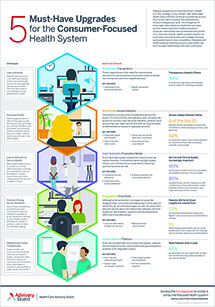Auto logout in seconds.
Continue LogoutEditor's note: This popular story from the Daily Briefing's archives was republished on June 28, 2019.
It's been nearly three years since Geisinger Health System began allowing dissatisfied patients to request refunds of up $2,000 with no questions asked—and Geisinger CEO David Feinberg said that patient satisfaction rates are up, Leo Vartorella writes for Becker's Hospital Review.
New: The patient financial experience toolkit
Under the ProvenExperience initiative, patients rate their experience on a mobile application and, if they're dissatisfied with their care, can request a refund of up to $2,000 of their out-of-pocket costs. Geisinger gives patients their full requested refund, no questions asked. A patient advocacy team then conducts a study to look into the complaint, assesses its legitimacy, and takes steps to ensure related problems don't happen again.
Feinberg said much of the groundwork for ProvenExperience had already been laid by department-level programs that waived costs for certain patients who were readmitted or failed to meet certain outcome quality levels.
'An amazing secret shopper program'
While offering a money-back guarantee may seem like a gamble, it appears to have paid off for Feinberg, Vartorella writes. Not only did Geisinger receive copious media coverage when it unveiled the program, but its patient satisfaction rates have improved.
The health system refunded $320,141 in fiscal year 2016, $411,325 in FY 2017, and as of March has refunded $266,340 for FY 2018.
"The first thing we learned is that it's an amazing secret shopper program. In the small pilot we saw that patients told you what was going well and what wasn't going well," Feinberg said. "If there is negative feedback, it's always coupled with the positive. And then they can ask for a refund, and almost every patient who asked for money back only requests a partial refund."
Feinberg said that feedback prompted the health system to implement new measures to better standardize care, such as color-coded uniforms. The health system also adopted CICARE, a structured conversation program that ensures all clinicians greet patients by name, introduce themselves, clearly communicate their actions, ask for permission to offer treatment, and respond to any questions—followed by "ending with excellence," Vartorella writes.
The health system also adopted the Talent Plus hiring tool—also used by the Ritz Carlton—which assesses whether a potential employee has the right service-minded mentality to go above and beyond for patients.
Feinberg's word to critics
Critics of the program have said that the success of the ProvenExperience initiative is uniquely attuned to Geisinger's area in Pennsylvania and that it wouldn't work at other health systems. But Feinberg points out that the same program was implemented at Geisinger's campus in Atlantic City, New Jersey, with similar results.
Skeptics also worry that patients might submit false claims for refunds, but Feinberg believes that anyone who thinks that "patients will take advantage of them should go into a different business."
Patients are "getting naked in front of us and allowing us to poke and prod them. They're telling us the most intimate details of their life," he said.
So what's Feinberg's takeaway message to critics? "If you don't believe in humanity, you're in the wrong business" (Vartorella, Becker's Hospital Review, 4/10).
New: The patient financial experience toolkit
As hospital margins remain narrow, health systems face enormous pressure to protect their revenue. At the same time, the rise of patient consumerism has pushed hospitals to offer a best-in-class patient experience. These goals can actually support each other: by offering an ideal patient financial experience, providers can increase a patient’s satisfaction, as well as a patient’s likelihood to pay.
Access this toolkit to get 8 resources to help revenue cycle leaders implement the ideal patient financial experience.
Don't miss out on the latest Advisory Board insights
Create your free account to access 1 resource, including the latest research and webinars.
Want access without creating an account?
You have 1 free members-only resource remaining this month.
1 free members-only resources remaining
1 free members-only resources remaining
You've reached your limit of free insights
Become a member to access all of Advisory Board's resources, events, and experts
Never miss out on the latest innovative health care content tailored to you.
Benefits include:
You've reached your limit of free insights
Become a member to access all of Advisory Board's resources, events, and experts
Never miss out on the latest innovative health care content tailored to you.
Benefits include:
This content is available through your Curated Research partnership with Advisory Board. Click on ‘view this resource’ to read the full piece
Email ask@advisory.com to learn more
Click on ‘Become a Member’ to learn about the benefits of a Full-Access partnership with Advisory Board
Never miss out on the latest innovative health care content tailored to you.
Benefits Include:
This is for members only. Learn more.
Click on ‘Become a Member’ to learn about the benefits of a Full-Access partnership with Advisory Board
Never miss out on the latest innovative health care content tailored to you.

